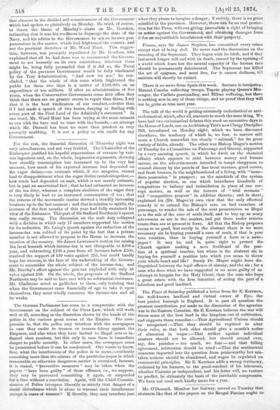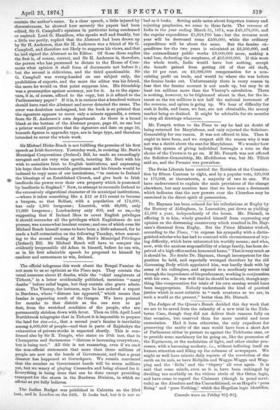Mr. O'Donnell, Member for Galway, moved on Tuesday that abstracts
like that of the papers on the Bengal Famine ought to 'contain the author's name. In a clear speech, a little injured by discursiveness, he showed how severely the papers had been -edited, Sir G. Campbell's opinions in particular being condensed -or omitted. Lord G. Hamilton, who speaks well and frankly, but a little too pertly, replied that the Abstract had been drawn up by Sir H. Anderson, that Sir H. Anderson was a friend of Sir G. Campbell, and therefore not likely to suppress his views, and that he had signed the Abstract as its Editor. Of those three replies the first is, of course, correct, and Sir H. Anderson is, therefore, the person who has presumed to dictate to the House of Com- mons what opinion it shall form of documents not before it ; but the second is ridiculous, and the third questionable. Sir -G. Campbell was wrong-headed on one subject only, the prohibition of exports, and the more the editor was his friend, the more he would on that point suppress him. His friendship was a presumption against accuracy, not for it. As to the signa- ture, it is, of course, affixed to the copy, but is it affixed to the Parliamentary paper ? If it is, it is curious that a hundred writers should have read the Abstract and never detected the name. The error was doubtless undesigned, but the book is so printed that the signature appears to cover only a minute appendix, a return from Sir H. Anderson's own department. As there is a broad blank at the bottom of the Abstract proper, page 49, no one but a printer would perceive that the signature and date on page 50, beneath figures in appendix type, are in large type, and therefore intended to cover the whole work.



































 Previous page
Previous page